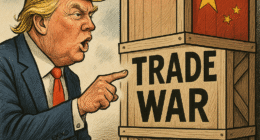Computer chip giant Nvidia said it would be hit with $5.5bn (£4.2bn) in costs after the US government tightened export rules to China.
The firm, which has been at the heart of the artificial intelligence (AI) boom, will require licences to export its H20 AI chip to China, which has been one of its most popular.
The rules come amid an escalating trade war between the US and China, with both countries introducing steep trade tariffs on each other covering various goods.
Nvidia shares plunged almost 6% in after-hours trading.
Nvidia announced on Tuesday that the US government had told it last week that the H20 chip required a permit to be sold to China, including Hong Kong.
The tech giant said federal officials had advised them the licence requirement “will be in effect for the indefinite future”.
“The [government] indicated that the license requirement addresses the risk that the covered products may be used in, or diverted to, a supercomputer in China,” Nvidia said.
The company declined to comment further when contacted by the BBC.
Marc Einstein from the Counterpoint Research consultancy said the $5.5bn hit estimated by Nvidia was in line with his estimates.
“While this is certainly a lot of money, this is something Nvidia can bear,” he said.
“But as we have seen in the last few days and weeks, this may largely be a negotiating tactic. I wouldn’t be surprised to see some exemptions or changes made to tariff policy in the near future, given this not only impacts Nvidia but the entire US semiconductor ecosystem,” Mr Einstein added.
Chips remain a battleground in the US-China race for tech supremacy, and US President Donald Trump now wants to turbocharge a highly complex and delicate manufacturing process that has taken other regions decades to perfect.
Nvidia’s AI chips have been a key focus of US export controls. Founded in 1993, it was originally known for making the type of computer chips that process graphics, particularly for computer games.
Long before the AI revolution, it started adding features to its chips that it says help machine learning. It is now seen as a key company to watch to see how fast AI-powered tech is spreading across the business world.
The company’s value took a hit in January when it was reported that a rival Chinese AI app, DeepSeek, had been built at a fraction of the cost of other chatbots.
At the time, the US was considered to have been caught off guard by their rival’s technological achievement.
Nvidia said its $5.5bn charges would be associated with H20 products for inventory, purchase commitments and related reserves.
Rui Ma, founder of the Tech Buzz China podcast, said she expects the US and China AI semiconductor supply chains to be “fully decoupled” if restrictions stay in place.
She added: “It doesn’t make any sense for any Chinese customer to be dependent on US chips” especially since there is an oversupply of data centres in China.













